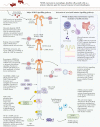NOD2 in Crohn's Disease-Unfinished Business
- PMID: 36006803
- PMCID: PMC10069614
- DOI: 10.1093/ecco-jcc/jjac124
NOD2 in Crohn's Disease-Unfinished Business
Abstract
Studies of Crohn's disease have consistently implicated NOD2 as the most important gene in disease pathogenesis since first being identified in 2001. Thereafter, genome-wide association, next-generation sequencing and functional analyses have all confirmed a key role for NOD2, but despite this, NOD2 also has significant unresolved complexity. More recent studies have reinvigorated an early hypothesis that NOD2 may be a single-gene cause of disease, and the distinct ileal stricturing phenotype seen with NOD2-related disease presents an opportunity for personalized diagnosis, disease prediction and targeted therapy. The genomics of NOD2 has much that remains unknown, including the role of rare variation, phasing of variants across the haplotype block and the role of variation in the NOD2-regulatory regions. Here, we discuss the evidence and the unmet needs of NOD2 research, based on recently published evidence, and suggest methods that may meet these requirements.
Keywords: NOD2; Crohn’s disease; IBD; genetics; genomics.
© The Author(s) 2022. Published by Oxford University Press on behalf of European Crohn’s and Colitis Organisation.
Conflict of interest statement
The authors declare no conflicts of interest.
Figures



References
-
- Eckmann L, Karin M.. NOD2 and Crohn’s disease: loss or gain of function? Immunity 2005;22:661–7. - PubMed
MeSH terms
Substances
LinkOut - more resources
Full Text Sources
Medical

